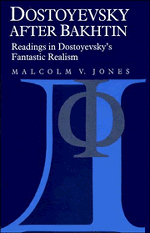Book contents
- Frontmatter
- Contents
- Preface
- 1 Introduction: Dostoyevsky's fantastic realism
- Part One The Underground
- Part Two Driving People Crazy
- Part Three Chinese Whispers
- 7 The Marion motif: the whisper of the precursor
- 8 The Brothers Karamazov: the whisper of God
- 9 Conclusion: Dostoyevsky's fantastic realism
- Notes
- Bibliography
- Index
9 - Conclusion: Dostoyevsky's fantastic realism
Published online by Cambridge University Press: 21 August 2009
- Frontmatter
- Contents
- Preface
- 1 Introduction: Dostoyevsky's fantastic realism
- Part One The Underground
- Part Two Driving People Crazy
- Part Three Chinese Whispers
- 7 The Marion motif: the whisper of the precursor
- 8 The Brothers Karamazov: the whisper of God
- 9 Conclusion: Dostoyevsky's fantastic realism
- Notes
- Bibliography
- Index
Summary
SOME GENERAL CONCLUSIONS
It may seem an anti-climax to state baldly at the close of this book that the essence of fantastic realism is an emotionally invested heteroglossia. Is that not after all exactly what Bakhtin's reading amounts to? Of course in one sense it is and my debt to Bakhtin is clear. What I have attempted to do however is to trace the implications of Bakhtin's insights in directions which he chose not to follow and which I would now claim are no less crucial to our understanding of the structure of the novels. What Bakhtin declines to do is to explore the consequences of failure to establish productive and creative subjective relationships with others, which Kohlberg has defined and which underlie the destructive, disruptive, irrational and subversive side to Dostoyevsky's vision of the world. But far from being peripheral, I have argued that these emotions are a vital element in his fantastic realism, affecting characters in their relations with each other and the narrator in his relationship with the reader. To which I would add that they are as vital to a Christian reading of the novel as to any other.
When Dostoyevsky insisted that his idealism was the truest realism, he was in effect claiming that emotionally invested heteroglossia is reality or as near as we can get to it.
- Type
- Chapter
- Information
- Dostoyevsky after BakhtinReadings in Dostoyevsky's Fantastic Realism, pp. 191 - 199Publisher: Cambridge University PressPrint publication year: 1990



